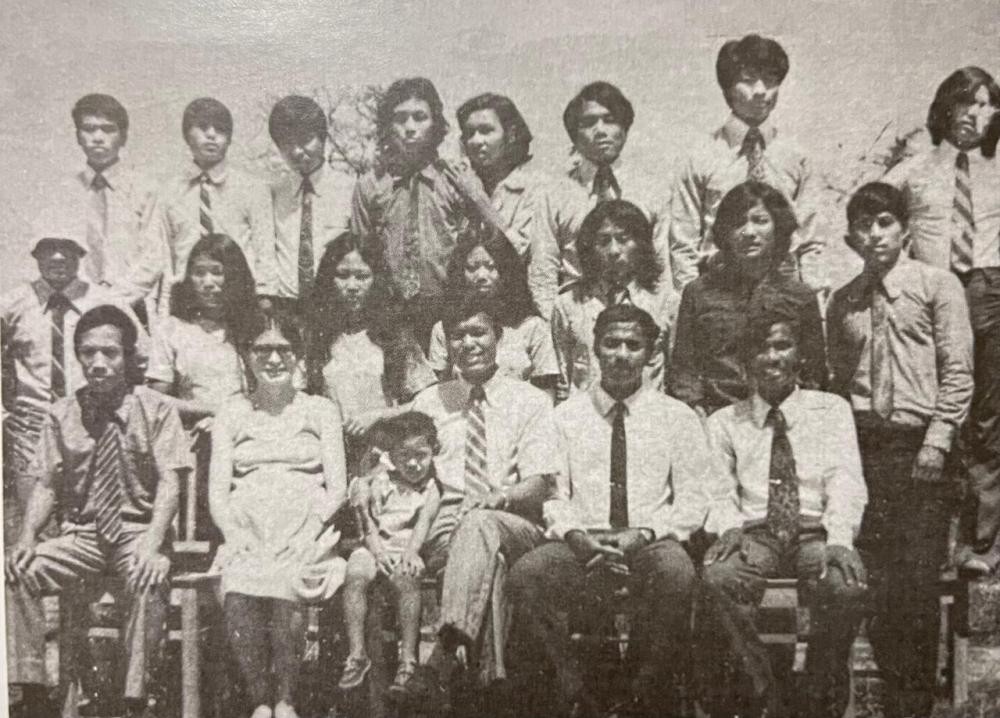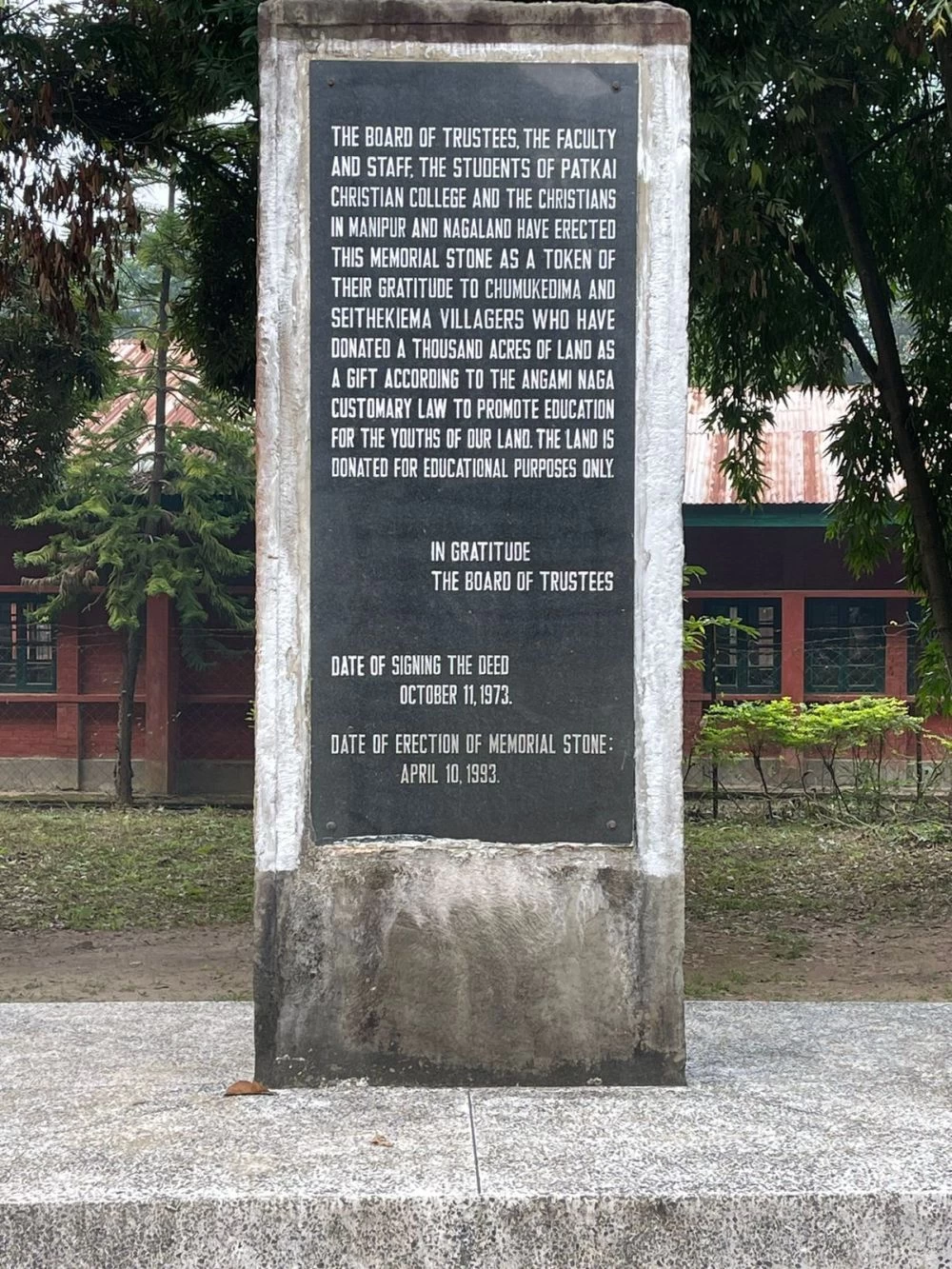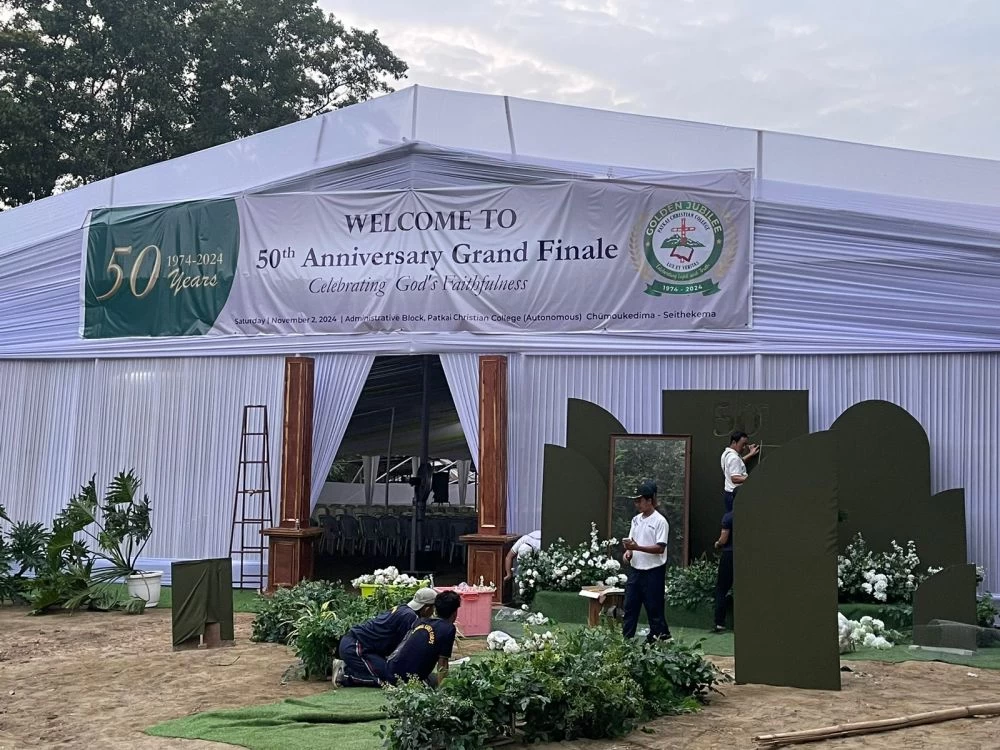The first batch of Patkai Christian College in 1974, alongside founding Principal Rev Dr Tuisem A Shishak and his late wife, Margaret Anne Shishak, along with other early faculty members. (Image Courtesy: As We Know Them: The Shishaks)

Moa Jamir
Reflecting on one’s alma mater is rarely straightforward; nostalgia and personal affinity often colour the lens through which achievements are viewed, at times veering towards hagiography.
Yet, as Patkai Christian College (PCC) – Autonomous prepares for the grand finale of its year-long Golden Jubilee celebration on November 2, there is undeniable significance in balancing pride with a reflective understanding of the institution’s achievements and values.
Since its establishment in the summer of 1974, Patkai has evolved from a college once dubbed a “jungle college” for its then-remote, isolated location into one of the leading educational institutions in Nagaland and the North-East.
Founded as a liberal arts college with a generous land donation of 1000 acres from Chümoukedima and Seithekema villages, the meteoric rise of Patkai from the initial student registration on August 28, 1974, and the beginning of classes with just 20 students and two lecturers on September 2, stands as a testament the impact it has had on countless lives.
The college’s motto, “Lux et Veritas: Light and Truth,” resonates with its legacy of illuminating the path of knowledge, character, and service.
Over five decades, it has earned a prominent place among educational institutions in both Nagaland and the North-East Region of India. Among other achievements, in 2005, it became the first college in the North-East to receive Autonomous Status from the University Grants Commission. More recently, in 2023, Patkai became the first college from Nagaland to be featured in the National Institutional Ranking Framework (NIRF) list of the top 200 colleges in India, and in 2024, it improved its ranking to the top 100-150 bracket.
Today, Patkai offers diverse programmes, including courses in Arts, Science, Commerce, and Music, with 15 undergraduate and seven postgraduate departments, along with diploma, certificate, and add-on courses for undergraduate students. Over 8000 students have graduated from the College with alumni as its most valued asset.

The original vision and values of Patkai’s co-founders, Rev Dr Tuisem A Shishak and his late wife, Margaret Anne Shishak, continue to shape the college. For Rev Dr Shishak, “Education is meant to develop the whole person within a framework grounded in spiritual and moral absolutes.”
This vision encompassed ethical thinking, social responsibility, and a commitment to public service—principles that remain embedded in Patkai’s approach to liberal education.
In a lecture, Rev Dr Shishak espoused on the concept of liberal arts, by noting how in the Middle Ages, these disciplines included the trivium (Grammar, Rhetoric, and Logic) and quadrivium (Geometry, Arithmetic, Music, and Astronomy).
Thus, liberal education was an essential preparation for life beyond employment, instilling a sense of purpose, civic responsibility, and intellectual rigour that transcends mere job readiness.
This commitment to holistic growth has helped shape generations of students at Patkai, cultivating both intellect and character.
The residential aspect of Patkai’s campus has also played a vital role in imparting moral values and fostering a close-knit, community-focused environment. As one of the first fully integrated residential campuses in Nagaland, Patkai has woven these principles into daily campus life, giving students a lived experience of its values.
Music, too, has long been a defining feature of the college’s identity, with the Margaret Shishak School of Music offering what is arguably the best music education in the region. Here, students are immersed in a rich repertoire of classical and western music, contributing to their cultural and artistic growth regardless of their area of study. The vast campus also provides space for sports and other co-curricular activities.
As the college celebrates its Golden Jubilee, this milestone offers an opportunity not only to commemorate past accomplishments but to assess the institution’s future direction in a rapidly evolving landscape.

Apt moment for introspection
While legacy is valuable, any institution can fall into complacency if it leans too heavily on past glory. To stay relevant, Patkai must continue to adapt, balancing tradition with innovation and proactively leading rather than reacting to the state or regional academic environment.
Clearly, a milestone like the Golden Jubilee is an apt moment for introspection. While celebrations may invoke nostalgia, they can also serve as a call to renew commitments to the values that have driven the institution’s mission.
In Patkai’s case, this involves not only retaining the guiding principles but also ensuring that future initiatives incorporate present-day realities. Patkai must remain responsive to current and emerging societal needs, equipping students with relevant skills and perspectives that prepare them for diverse careers and global citizenship. Patkai could take a pioneering role by focusing on initiatives such as environmental stewardship, policy research, physical education, and fostering an entrepreneurial spirit.
An anniversary also connects the present with the past. This 50th year is a time to reach out to alumni and reflect on the college’s impact on the lives of those it has educated. Alumni contributions are invaluable, but it’s essential to recognise that today’s students are the future ambassadors and legacy bearers. By actively involving them in ongoing initiatives and projects, the college can build a stronger bridge between the past, present, and future. Celebrating the Golden Jubilee is a way to honour the past while inspiring the present generation to carry forward Patkai’s legacy.
As Patkai looks to the years ahead, the dialogue about its future reflects the evolving landscape of careers and disciplines that can be pursued in today’s world. Staying relevant and impactful will require Patkai to continually adapt its programmes, methodologies, and campus life to meet the changing needs of society. These efforts can help ensure that Patkai’s influence remains strong, that the light it has cast for 50 years does not fade, and that its commitment to truth endures.
Patkai’s past legacy is not only a foundation but also a guidepost for progress. Celebrating the Golden Jubilee isn’t simply a backward glance; it’s an invitation to chart a purposeful course for the future, connecting past achievements with new aspirations.
The writer is the Associate Editor, The Morung Express, and an Alumnus of Patkai Christian College Autonomous, 1996-2001 Batch. Views are personal.
The article has been update to reflect latest status of students graduating from the college.




